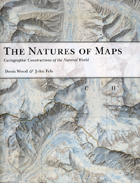2 books by Pickles, John

The Anomie of the Earth
Philosophy, Politics, and Autonomy in Europe and the Americas
Federico Luisetti, John Pickles, and Wilson Kaiser, eds.
Duke University Press, 2015
The contributors to The Anomie of the Earth explore the convergences and resonances between Autonomist Marxism and decolonial thinking. In discussing and rejecting Carl Schmitt's formulation of the nomos—a conceptualization of world order based on the Western tenets of law and property—the authors question the assumption of universal political subjects and look towards politics of the commons divorced from European notions of sovereignty. They contrast European Autonomism with North and South American decolonial and indigenous conceptions of autonomy, discuss the legacies of each, and examine social movements in the Americas and Europe. Beyond orthodox Marxism, their transatlantic exchanges point to the emerging categories disclosed by the collapse of the colonial and capitalist frameworks of Western modernity.
Contributors. Joost de Bloois, Jodi A. Byrd, Gustavo Esteva, Silvia Federici, Wilson Kaiser, Mara Kaufman, Frans-Willem Korsten, Federico Luisetti, Sandro Mezzadra, Walter D. Mignolo, Benjamin Noys, John Pickles, Alvaro Reyes, Catherine Walsh, Gareth Williams, Zac Zimmer
Contributors. Joost de Bloois, Jodi A. Byrd, Gustavo Esteva, Silvia Federici, Wilson Kaiser, Mara Kaufman, Frans-Willem Korsten, Federico Luisetti, Sandro Mezzadra, Walter D. Mignolo, Benjamin Noys, John Pickles, Alvaro Reyes, Catherine Walsh, Gareth Williams, Zac Zimmer
[more]

The Natures of Maps
Cartographic Constructions of the Natural World
Denis Wood and John Fels
University of Chicago Press, 2008
Cartographers have known for decades that maps are far from objective representations of the world; rather, every map reflects the agendas and intentions of its creators. Yet that understanding has had almost no effect on the way maps are viewed and used by the general public. In The Natures of Maps, cartographers Denis Wood and John Fels present a compelling exploration of a wide range of maps to answer the question of, as they put it, why maps have “gotten away with it.”
To answer that question, the authors turn to a category of maps with a particularly strong reputation for objectivity: maps of nature. From depictions of species habitats and bird migrations to portrayals of the wilds of the Grand Canyon and the reaches of the Milky Way, such maps are usually presumed—even by users who should know better—to be strictly scientific. Yet by drawing our attention to every aspect of these maps’ self-presentation, from place names to titles and legends, the authors reveal the way that each piece of information collaborates in a disguised effort to mount an argument about reality. Without our realizing it, those arguments can then come to define our very relationship to the natural world—determining whether we see ourselves as humble hikers or rampaging despoilers, participants or observers, consumers or stewards.
Richly illustrated, and crafted in vivid and witty prose, The Natures of Maps will enlighten and entertain map aficionados, scholars, and armchair navigators alike. You’ll never be able to look at Google Maps quite the same way again.
To answer that question, the authors turn to a category of maps with a particularly strong reputation for objectivity: maps of nature. From depictions of species habitats and bird migrations to portrayals of the wilds of the Grand Canyon and the reaches of the Milky Way, such maps are usually presumed—even by users who should know better—to be strictly scientific. Yet by drawing our attention to every aspect of these maps’ self-presentation, from place names to titles and legends, the authors reveal the way that each piece of information collaborates in a disguised effort to mount an argument about reality. Without our realizing it, those arguments can then come to define our very relationship to the natural world—determining whether we see ourselves as humble hikers or rampaging despoilers, participants or observers, consumers or stewards.
Richly illustrated, and crafted in vivid and witty prose, The Natures of Maps will enlighten and entertain map aficionados, scholars, and armchair navigators alike. You’ll never be able to look at Google Maps quite the same way again.
[more]
READERS
Browse our collection.
PUBLISHERS
See BiblioVault's publisher services.
STUDENT SERVICES
Files for college accessibility offices.
UChicago Accessibility Resources
home | accessibility | search | about | contact us
BiblioVault ® 2001 - 2024
The University of Chicago Press









